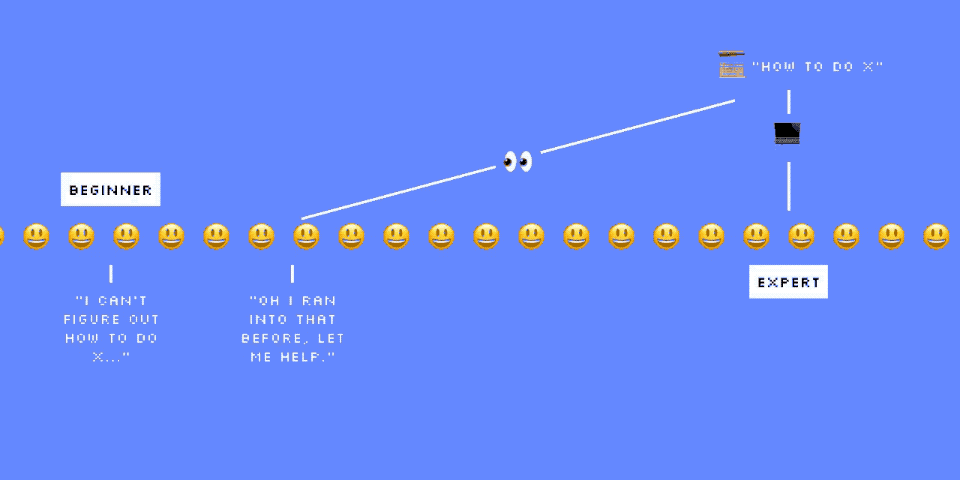Are you the #1, absolute best in the world at something?
No? Not a problem.
What about top 1%? Top 50%? Have you done something for a year? For a few months? Are you on day one? Still no problem.
You have something worthwhile to share.
It might even be more useful than that #1 best-in-the-world guru’s advice. Jason Fried, co-founder of Basecamp, has a good example from the business world. He was on The Chase Jarvis Live show in 2018 and he talked about people giving advice on things they haven’t done for decades. From “It Doesn’t Have to be Crazy at Work with Jason Fried” (2018):
I think in our world, in the entrepreneurial world, especially, there’s a lot of people dishing advice that haven’t done the thing ever. Or they did it a long time ago. And I think you need to discount that. I think advice goes stale. It has a half life. And it’s pretty quick.
Experts know a lot (but they forget things along the way)
Having access to expert knowledge will help when you’re learning something new. They’ve been around long enough to understand the principles that matter over the course of years.
They’ve forgotten what it’s like to be completely new to a discipline.
Brian Koppelman, co-creator of Billions and co-writer of Rounders talks about how he’s been in the business long enough that he’s no longer an expert in breaking in. From his Q&A on 2/21/19:
A bunch of questions are about how to break into the business. I’ve written some thoughts about this on my blog. But I don’t have a great answer for you. You know, one thing I really don’t like is when people hold themselves out as an expert on something on which they’re not an expert
I’m not an expert on breaking in anymore. I broke in 22 years ago.
And I’m so far away from that moment that I can’t answer the question. My answers feel idealistic. They’re just all about doing the work. They’re all about producing the pages and making something so undeniable, a script or a short, that it gets people’s attention.
But the truth is there are people much closer to the ground who can answer that question better than I can.
As someone works their way up in their career, they’re further removed from the work on the ground. It’s good to have access to resources from people who aren’t so deep into their expertise. They have a better memory of the hurdles immediately facing a beginner.
You can be this resource for other people.
What would you teach yourself 6 months ago?
Let’s say you’ve started making things online and sharing them on social media. You’ve been doing this for a year and now have some systems in place.
Would those systems be useful to you 6 months ago? Yes.
Some other questions that lead to answers that would be useful to you 6 months ago.
- What have you started doing in the past 6 months to make your work easier?
- What dumb issues did you face in the past 6 months that have solutions that seem obvious now?
- What resources have you learned about in the past 6 months?
The great thing, of course, is that there are people who are currently in the same position you were 6 months ago.
Write answers to those questions and share them with others.
See one, do one, teach one (but with your online writing)
There’s a teaching phrase called “See one, do one, teach one” that comes from medical surgery. You see an expert do it, you do it yourself, and then you teach another trainee.
There are arguments against the approach in surgery, particularly in terms of patient safety. I’m not a medical expert or a teaching expert. This paper seems to do a good job pointing out that the phrase is oversimplified but is useful with some modifications.
However, it can be built upon and greatly enhanced with various learning principles, committed mentors, and advanced technology, such as medical simulators. Residents must be encouraged and given the opportunities to learn and improve upon their surgical skills by mentors who continue to improve upon their skills as well.
Here’s my modification for, let’s say, getting better at making things online.
- Watch a bunch, do it a bunch (while being watched), and teach it a bunch.
Here’s how you can do that by sharing your learning through writing.
- Watch a bunch (Read, watch, and listen to experts) — Even better if you can talk to an expert to talk about your specific experience. Organize and share these resources with other people.
- Do it a bunch (Share it so others can give feedback) — If you’re trying to improve as a writer, publish things online and seek out feedback. If you’re learning to make videos, publish them and seek out feedback. If you’re making a podcast… okay same thing. And you can share the different stages. Share an outline with someone to get feedback. Have someone take a look at your interview questions to see if they find them interesting.
- Teach it a bunch (Awareness helps you correct your own mistakes) — If you capture your thought process along the way, you can review them as you gain more experience to see where your approach was wrong. Then you can help prevent others from making those same mistakes. The old articles you wrote act as proof that you really were in their position at one point in time. And your current level of success can motivate others. As you write, you’ll see the gaps in your own knowledge that you’ll need to fill in and cement.
If you do this for long enough, you’ll work your way up toward the top 50%, top 25%, top 10%.
And you’ll always have something worth sharing along the way.
